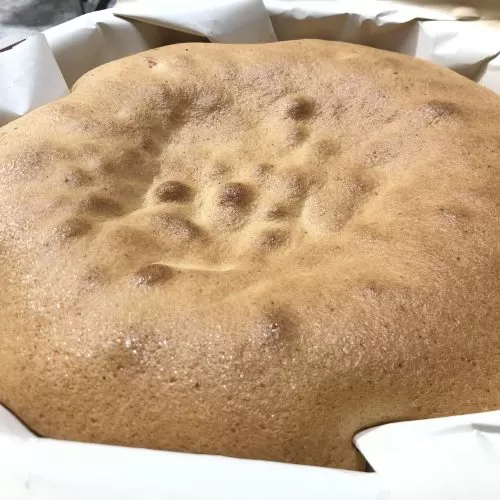Easy Pão de Ló Recipe (Pão de Castela Portuguese Sponge Cake)

Best known sponge cake in Portugal and the Azores. Our easy Pão de Ló Recipe (Portuguese Sponge Cake) also known as Pão de Castela or Castela cakes is made the traditional way with just three ingredients, flour, eggs, and sugar. Pão de Ló or Pão de Castela or Castella cakes, Portuguese Sponge cake dates back to the 15th century and has been a staple in Portuguese heritage ever since.
How To Make Pão de Ló (Pão de Castela (Portuguese Sponge Cake)
Making these ubiquitous Portuguese sponge cakes also referred to as Pão de Ló , Pão de Castela, or Castella Cakes are super easy. Preparation and makeup of these only take just a few minutes.
What Do You Need To Make Pão de Ló ( Portuguese Sponge Cake)
To make Pão de Ló ( Portuguese Sponge Cake) doesn’t require any special equipment or ingredients. This cake is made with 3 ingredients and all you need to prepare it is a mixing bowl or mixer, whisk and cake pan. Traditionally, Portuguese sponge cake are baked in a large clay pot lined with sheets of baking paper or parchment paper. If you don’t have a clay pot you can just use a fluted cake pan or bundt pan.
Ingredients to make Pão de Ló (Pão de Castela Portuguese Sponge Cake)
- 250 grams whole eggs room temperature (5 large eggs)
- 100 grams egg yolk room temperature (5 yolks from large eggs)
- 120 grams of all-purpose flour ( 1cup)
- 180 grams of granulated sugar ( 3/4 cup plus 2 tablespoons)
Instructions How To make Pão de Ló, (Pão de Castela Portuguese Sponge Cake)
- Preheat your oven to 200°C (390°F) and set the oven rack to the middle position.
- Line your clay pot with 2 to 3 sheets of parchment paper. Make sure the sides of the clay pot are fully covered.
- If you don’t have a clay pot, rub butter or margarine on the bottom and side of a fluted cake pan, then dust with flour.
- In a mixing bowl add the eggs and sugar and whisk at high speed until the mixture is light and fluffy about 15-20 minutes. If you don’t have a stand mixer follow the same step with a hand beater.
- Once the egg mixture is ready, carefully add and fold in the flour in steps using a spatula and blend until the mixture is well combined.
- Pour the batter into your clay pot or fluted cake pan.
- Bake at 200°C for 10 minutes then drop the oven to 180°C (350°C) and continue to bake for an additional 20-25 minutes or until the top of the cake is golden light brown. Before removing the cake from the oven, stick in a toothpick or knife, the sponge cake is ready when it comes out dry.
- Once the cake is baked, remove from the oven and set on a rack or cooling pad for 20-30 minutes.
- Enjoy your yummy traditional Portuguese Pão de Ló cake.

PÃO DE LÓ RECIPE (Portuguese Sponge Cake)
Ingredients
- 250 grams whole eggs room temperature 5 large eggs
- 100 grams egg yolk room temperature 5 yolks from large eggs
- 120 grams of all-purpose flour 1cup
- 180 grams of granulated sugar 3/4 cup plus 2 tablespoons
Instructions
- Preheat your oven to 200°C (390°F) and set the oven rack to the middle position.
- Line your clay pot with 2 to 3 sheets of parchment paper. Make sure the sides of the clay pot are fully covered.
- If you don’t have a clay pot, rub butter or margarine on the bottom and side of a fluted cake pan, then dust with flour.
- In a mixing bowl add the eggs and sugar and whisk at high speed until the mixture is light and fluffy about 15-20 minutes. If you don’t have a stand mixer follow the same step with a hand beater.
- Once the egg mixture is ready, carefully add and fold in the flour in steps using a spatula and blend until the mixture is well combined.
- Pour the batter into your clay pot or fluted cake pan.
- Bake at 200°C for 10 minutes then drop the oven to 180°C (350°C) and continue to bake for an additional 20-25 minutes or until the top of the cake is golden light brown. Before removing the cake from the oven, stick in a toothpick or knife, the sponge cake is ready when it comes out dry.
- Once the cake is baked, remove from the oven and set on a rack or cooling pad for 20-30 minutes.
- Enjoy your yummy traditional Portuguese Pão de Ló cake.
